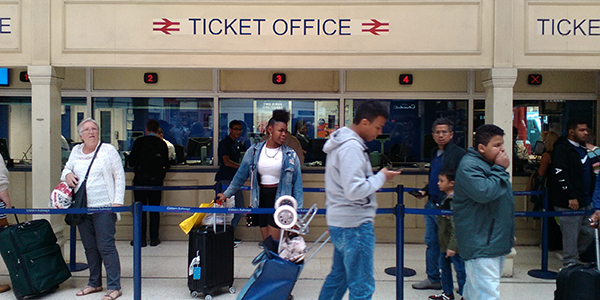When you’re deaf, public transport can be a nightmare
I’m a lady of a certain age, as they say, and I am very deaf. I love travelling and use public transport all over the place, very regularly. My bus pass is one of my most treasured possessions.
For deaf people, things aren’t too bad with public transport – although I dread people trying to make conversation with me over the noise of a bus. I used to love random conversations with strangers before I lost my hearing, but now I either have to ignore them, confess my disability, or struggle to take part.
Noisy ticket offices are a big barrier for deaf people

For me, there is one huge and significant barrier to transport, and I’m sure I’m not alone in dreading this – the Ticket Office. Railway stations are the worst. The noise levels in these places is horrendous. Sudden noises, like the blare of a station announcement, cause torment to our hearing aids.
Buying a ticket used to be a friendly experience – mulling over the options, speculating on the price differences, and looking forward to the trip. Not now.
First of all, I do everything I can to check the information online, purchase online, and use ticket machines on stations. But what if the journey is a bit complicated? Or you’re in a foreign country? Or you’re not sure about the prices? This is where the trouble starts.
The barrage of questions about tickets can be a communication nightmare
I love going to Cornwall, but my train journey involves a change and I like plenty of time to get from one platform to another. So a few days before, I visit my local station to get my ticket. I have my query all prepared – in fact, I write it out on a piece of paper, having looked it all up first online.
But it’s like when you speak another language – however well you’ve prepared your query, you can’t anticipate the answer. In fact, if you’ve got your query spoken extremely well, it’s assumed you’re perfectly able to communicate, and the response corresponds to this.
Oh dear. There follows a barrage of questions, including the type of railcard, choice of station for the change, platform numbers, on- or off-peak ticket, and so it goes on. During this time, train whistles screech, announcements blare, and of course the queue behind you gets longer and longer, and you can sense its impatience. On top of this, station officials vary from the charming and patient, to the less than tolerant. It’s a nightmare.
I often try to disguise my disability and depend on kindly people to help
Once you’re on the train, you can’t make out the announcements. They might be telling you the buffet closes in half an hour, or they could be warning you your train is terminating at the next station and you’ll need to change.
So yes, there are quite a few problems for us deaf travellers, and I can see no solution to them.
Transport is intrinsically noisy. I find the t-switch / telecoil option on my hearing aids – which is supposed to help pick up the sound of electronic announcements via magnetic signals – doesn’t really work for me.
Mainly, I’m dependent on kindly people to interpret for me – and fortunately, there are plenty of these people around.
I’m sure I’m not alone, in that I try to disguise my disability. It makes me feel so stupid and I will do anything to cover it up.
But to me, travel is still a great joy, and I don’t let these problems spoil it for me.
No one should be left out of life
Agree? Sign our left out of life pledge.

